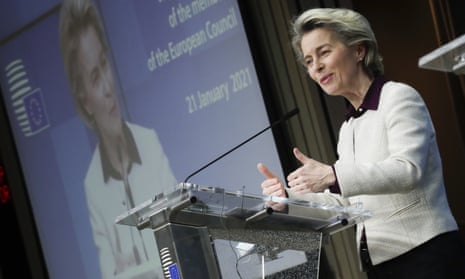Many EU countries may have more than enough to deal with domestically – from surging Covid cases in Portugal to forthcoming regional elections in Spain and political turmoil in Italy – but the events of Friday night, and of the preceding few days, have not gone unremarked in the European press.
Fears over delays in receiving vaccines and questions over procurement and investment were all brought into uncomfortably sharp focus over the weekend after the EU’s messy announcement of potential export controls on vaccines produced within the bloc.
Germany’s Die Zeit said the European commission had unwittingly provided “the best advertisement for Brexit: it is acting slowly, bureaucratically and in a protectionist manner. And if something goes wrong, it’s everyone else’s fault.”
Die Welt was similarly unflinching in its appraisal of the situation, accusing the European commission president, Urusla von der Leyen, of a hugely counterproductive strategy.
“Hardliners in the UK will not forget Von der Leyen’s Brexit own-goal, and will use it as a welcome template if torpedoing the Brexit agreement pays off domestically,” it said.
“Meanwhile, pro-Europeans on the island will increasingly be wondering whether the departure from Brussels was such a bad thing after all.”
Andrés Gil, Brussels correspondent for the online Spanish newspaper elDiario, also noticed an increase in hostilities.
“There isn’t just a vaccine war between the EU and the AstraZeneca laboratory over the delay announced in deliveries,” he wrote. “That war is now causing collateral damage with the UK, the country that just left the EU after four years of tough negotiations.”
An editorial in El País – published the day before Friday’s U-turn – noted that while the EU’s centralised purchase scheme had prevented inefficient and unfair “healthcare nationalism”, mistakes had been made.
“If you compare its actions with those of other administrations, the EU has acted with a certain slowness that has led to the late signing of contracts, which is now becoming a problem.”
A leader in El Mundo, meanwhile, concluded: “These days, the EU is giving off the same feeling of vulnerability and confusion that we saw during the first weeks of the coronavirus outbreak.”
There was a similar sense of exasperation from France’s Le Monde. The paper acknowledged that the pandemic had pitched political and business leaders into a situation “as exceptional as it is unpredictable” – and said that the EU was “ill-equipped for health emergencies of this magnitude”. But that, it added, was no excuse for the bloc’s failure to adhere to its founding philosophy.
“It is lamentable that political interests and geopolitical rivalries are taking precedence over the issue that no one should lose sight of: vaccinating as many people as possible, in Europe and in the rest of the world. This was the initial aim of the EU, which saw the vaccine as a ‘global common good’. It’s time to come back to that, with unqualified cooperation between governments and the pharmaceutical industry.”
In Portugal, where the health system is being stretched to breaking point, Público stepped back to offer some perspective.
“Even if there’s some anguish in the mix, it’s good to see that the European commission is fighting for the thing that will make all the difference: the speed of the vaccine supply from pharmaceutical companies,” said the paper.
“How different our negotiating skills would be if we were not members of the EU. Vaccination is the brightest light at the end of this tunnel in which we find ourselves. Even if some spectres cast shadows, we have to focus on vaccination and on demanding speed and transparency.”









